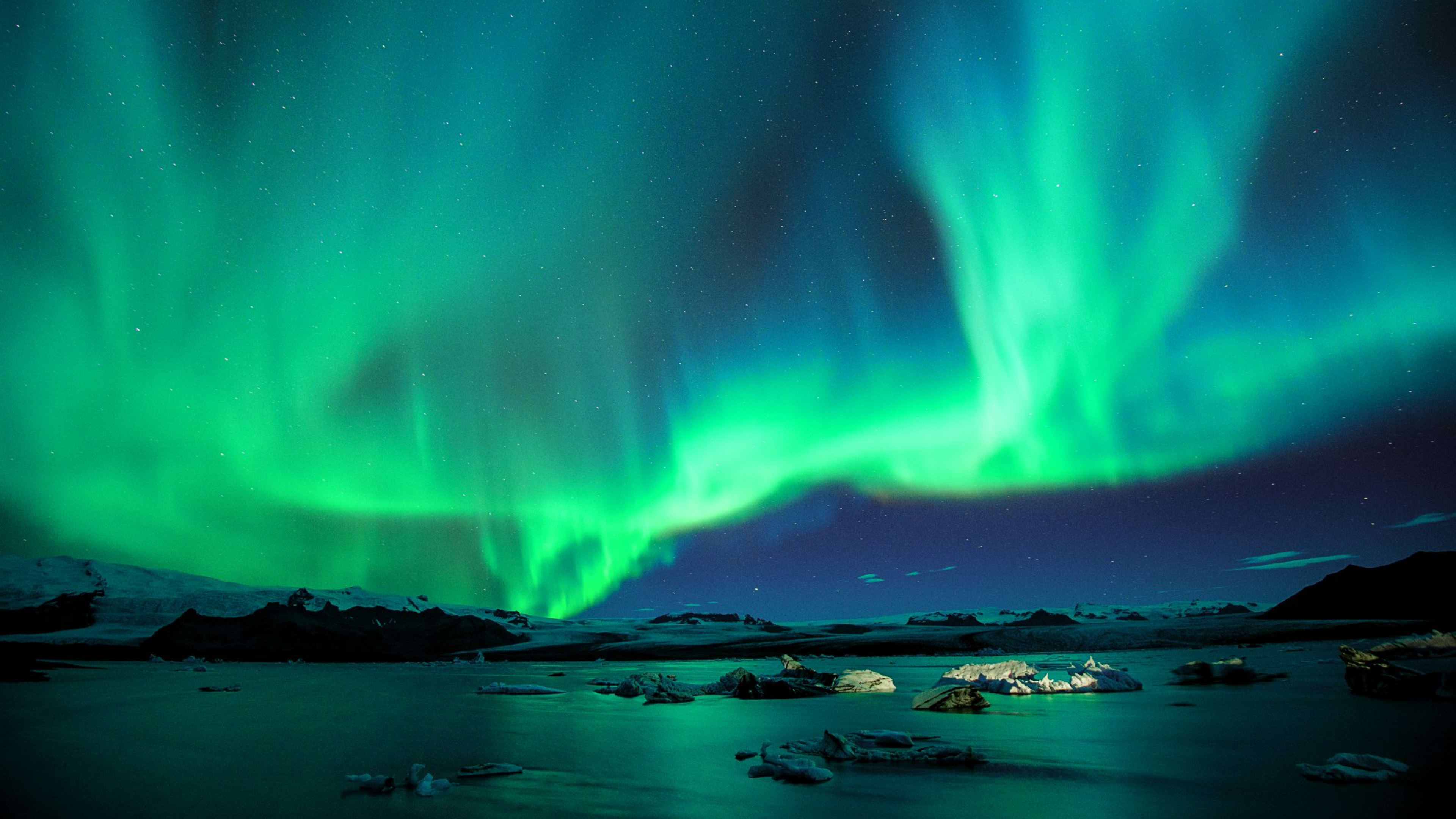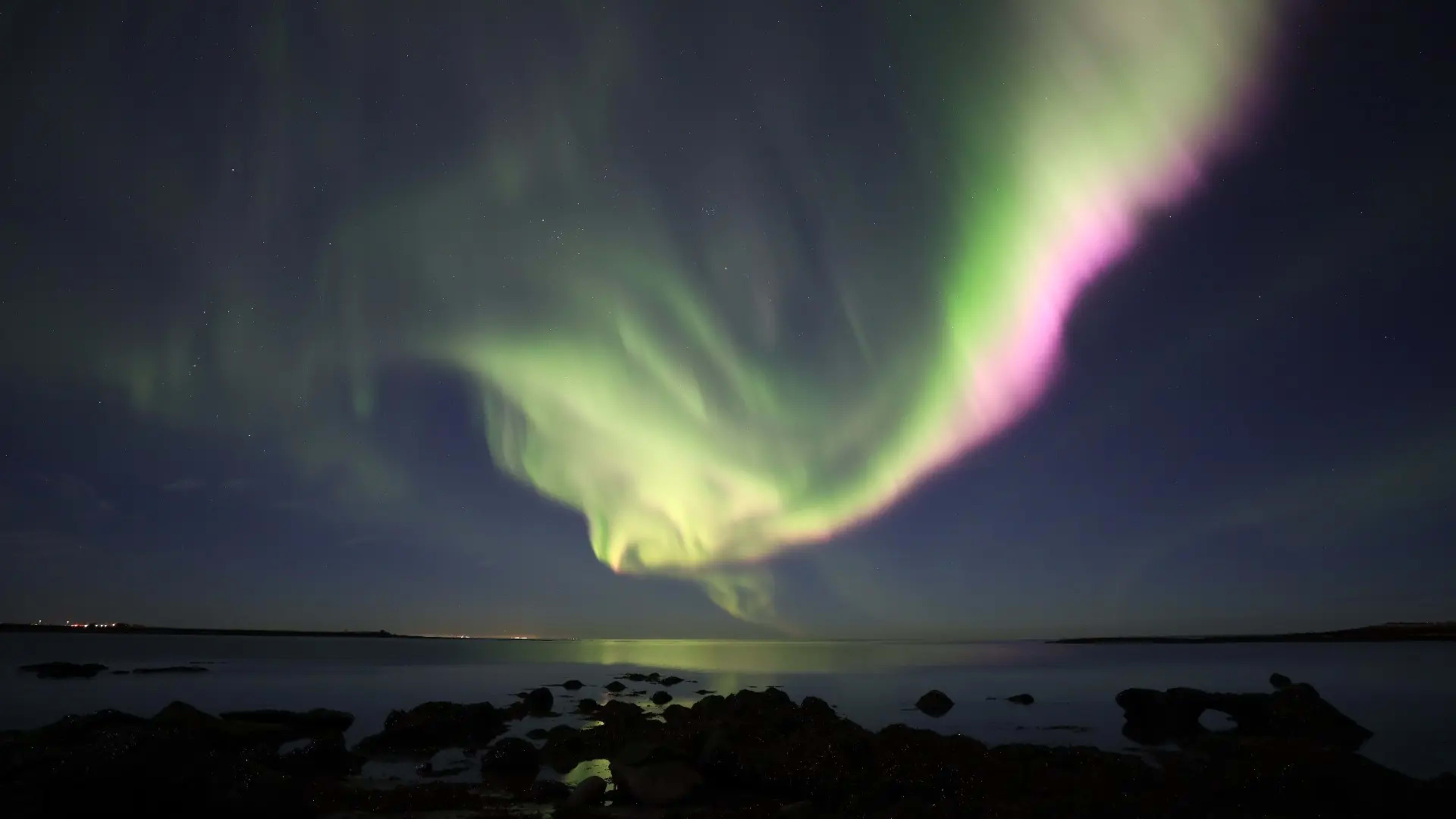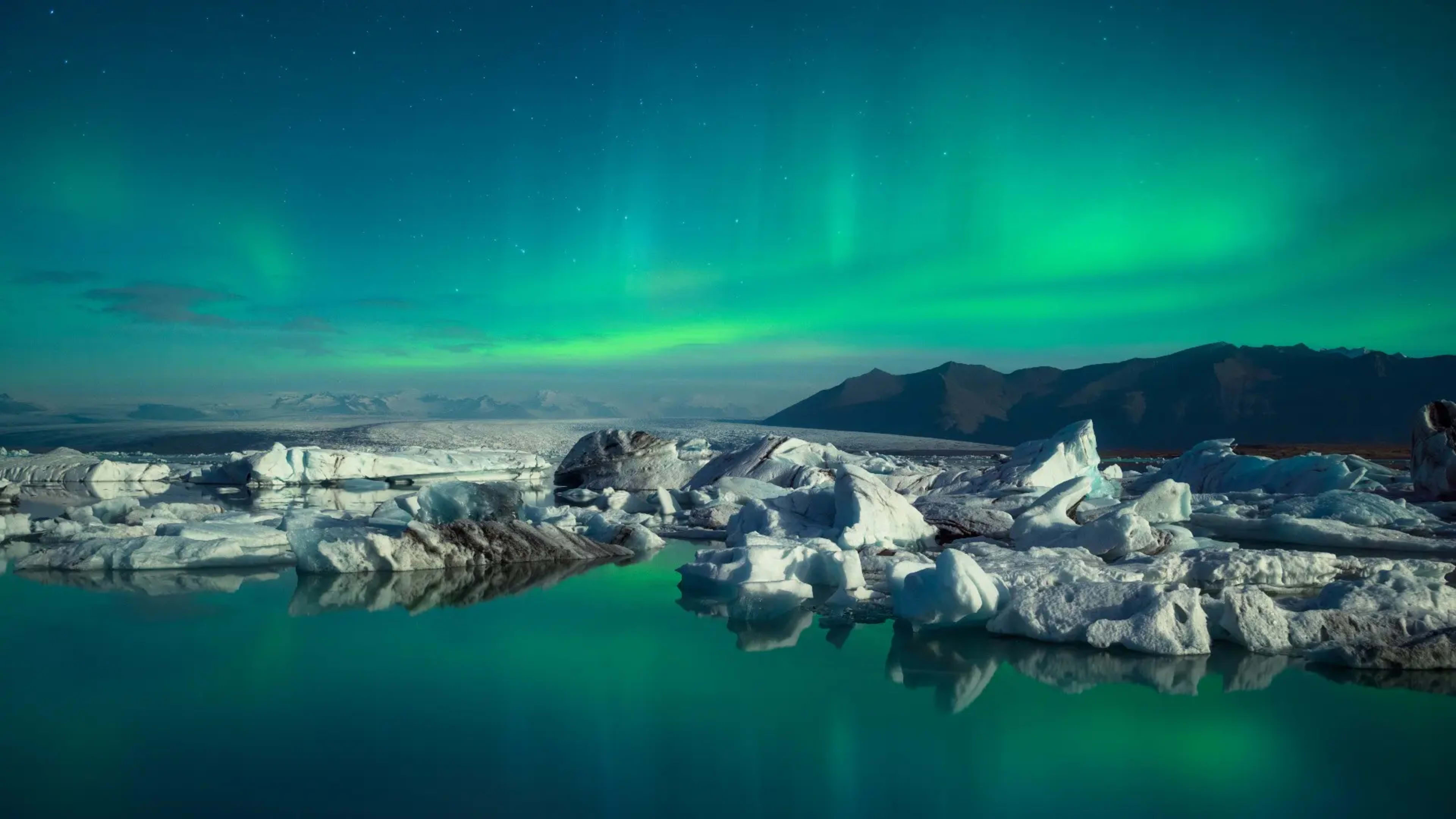Have you always wanted to witness the Northern Lights in Iceland? Or are you intrigued by them? This magnificent feat of nature has inspired people for centuries and it’s definitely worth adding to your bucket list.
With our ultimate guide to the Aurora Borealis in Iceland, you’ll learn more about this phenomenon, how it is formed, and where and when to see it in the Land of Fire and Ice.
- Browse Northern Lights tours of Iceland to plan your adventure.
About the Northern Lights
The Northern Lights, also Aurora Borealis, are the green and sometimes pink ribbons of color that can be seen in dark skies. They are “northern” because they occur near the north pole. You’ll find a similar occurrence in the southern hemisphere called Southern Lights or Aurora Australis.
Now onto the real questions. What are they? How long do Northern Lights last? Do the Northern Lights happen every night? We’re here to dish it all out for you.
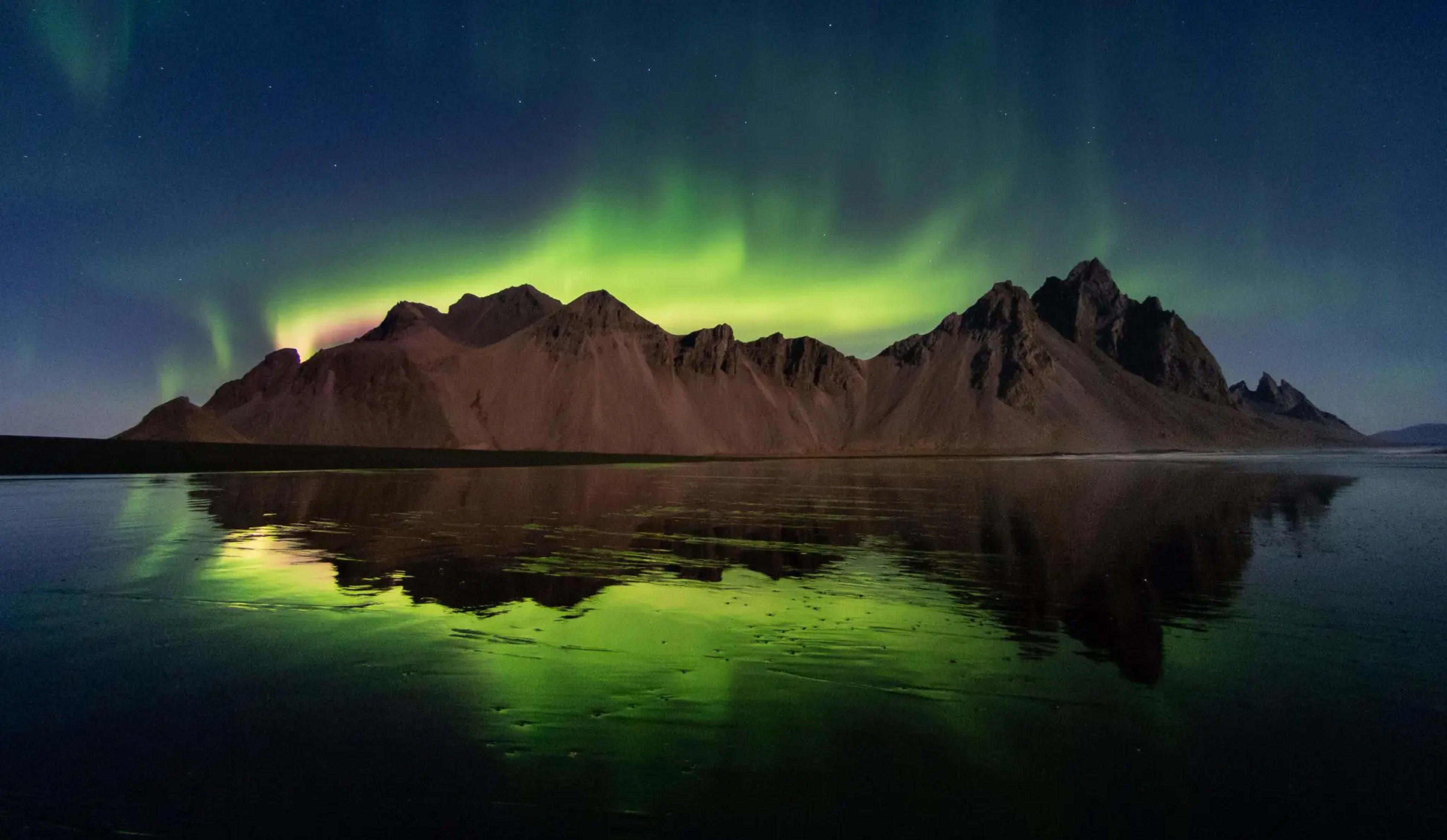
What are the Northern Lights?
This phenomenon is created by giant flares from the sun or solar storms. These happen about 150 million kilometers away from Earth. The flares then send blasts of charged particles towards our planet.
These solar winds take around 40 hours to reach Earth, and once the particles come into contact with Earth’s atmosphere, it creates a reaction. The results are glowing emissions that create the light show in our night skies: the Northern Lights!
It’s good to know that the lights can have more than one appearance. The type of atoms involved, the intensity of the solar activity, and the pull of Earth’s magnetic field all have a role to play. The lights can appear in a variety of shapes, movements, brightness, and colors.
The most common color of the Northern Lights is green. But, if you’re lucky, you may be able to see pink, violet and red ones. As for shape, they vary from simple ribbon to a full rippling curtain, and sometimes arcs and streaming rays.
The length of the display also varies depending on the solar activity. Generally, you can expect a good light show to last between 15 and 30 minutes. And if you’re really lucky, it may go on for a couple of hours.
- See all the activities you could add to your itinerary, from Northern Lights to super jeep tours.
Can you predict Northern Lights?
As they are dependent on the “space weather”, it’s difficult to accurately predict the Northern Lights in advance. Just like normal weather, it can vary and change at a moment’s notice.
But once you’re in Iceland, you can keep an eye on the Icelandic Met Office’s aurora forecast. It gives you a rating, between 0 to 9, of your likelihood of seeing the Auroras. Anything above a 2 is promising.
As the Northern Lights are best witnessed on a clear night, one without cloud cover, you should keep an eye on the weather conditions too.
These tools can also help with your Northern Lights hunt:
- Aurora Forecast app: Track where and when the Northern Lights will appear.
- Cloud Cover Forecast: Receive the latest weather updates to find out whether you’ll have a clear night or not
- SolarHam: Get a reliable 3-day geomagnetic forecast so you can plan your upcoming excursions.
Is Iceland a good place to see the Northern Lights?
This is the question if you want to see them while visiting Iceland. And thankfully the answer is yes! Iceland is an excellent location to witness the Aurora Borealis.
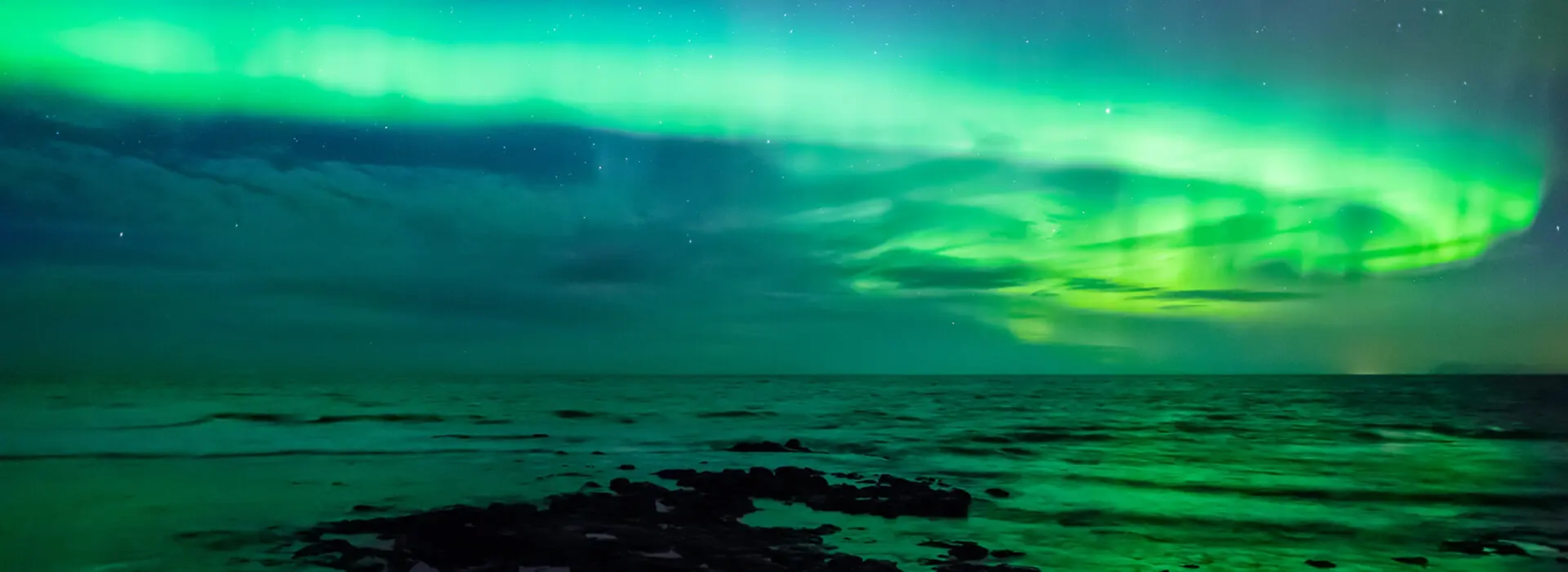
Did you know that there is a region called the “Northern Lights belt”? It circles the Earth between 65 and 72 degrees north (parallel) and has a high auroral frequency and intensity. The north of Iceland sits just within this belt, making it a prime location for a sighting.
How often are Northern Lights visible in Iceland? As part of the country is sat within this famous belt, in winter your chances of seeing the Northern Lights are high. That said it is a natural phenomenon and therefore always dependent on weather and solar activity, as explained above.
- Book a private tour of Iceland to hunt for the Northern Lights with a local guide.
When to visit Iceland to see the Northern Lights
So when should you plan your trip to Iceland if your main goal is to see the Auroras? Read below to plan your dream winter getaway. (And yes, that was your first clue!)
When is Northern Lights season in Iceland?
You could simply call the Northern Lights season winter. This is the best time to visit Iceland to see the Northern Lights thanks to the longer nights of the season. Some regions get as many as 19 hours of darkness in the depth of winter.
This means you’ll have a greater chance of seeing the lights between October and March.
- Browse winter tours of Iceland.
Can you see the Northern Lights in summer?
Anytime between mid-April and mid-August is not ideal. With the phenomenon of the midnight sun, it’s much harder to see Auroras with the naked eye at that time of year.
But we can dispel the myth that the Northern Lights aren’t visible in summer. From mid-August you may be able to see the lights in the dark sky. This is because daylight hours are starting to decrease. Longer nights give you more opportunities to see the Aurora Borealis.
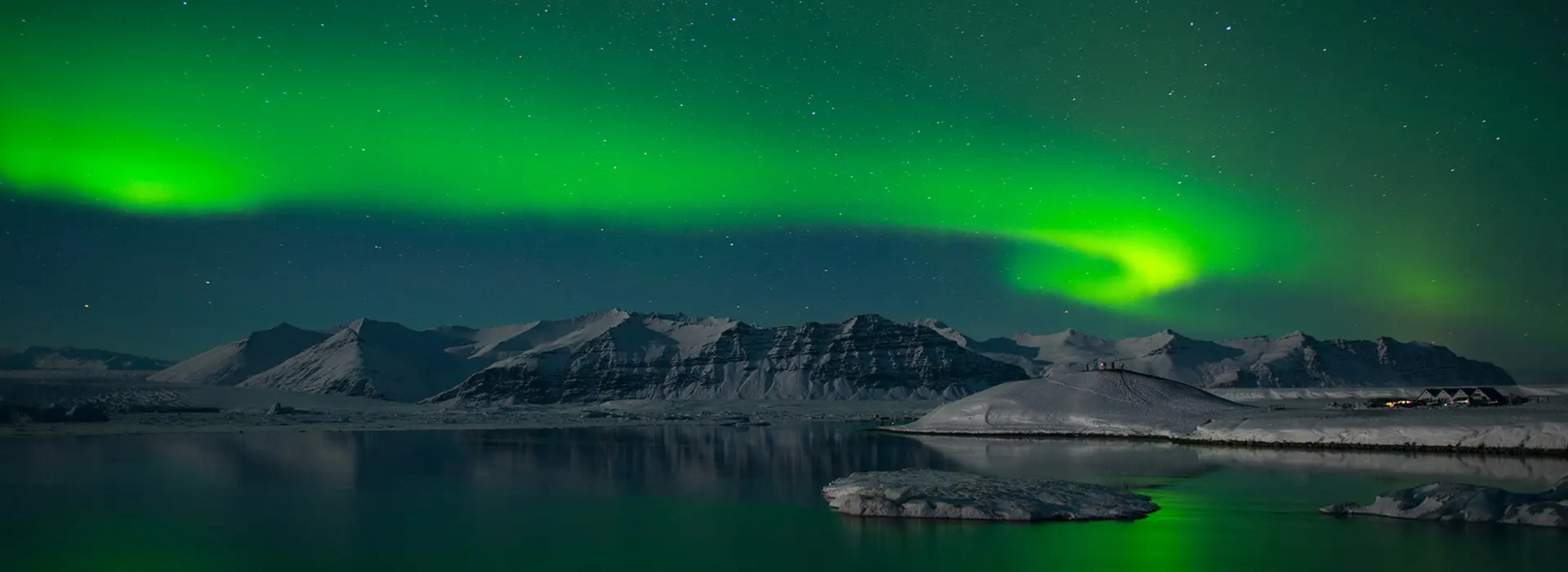
What is the best month to see the Northern Lights in Iceland?
There is no single best month to see the Northern Lights. As mentioned above, you should visit Iceland between the months of October and March for your best chances.
When is the best time of the day to see the Northern Lights?
As you can only see the Aurora Borealis if the sky is dark, that rules out the daytime. Even in wintertime, you’ll want to avoid hunting for the lights during the few hours of daylight.
Once darkness sets in, the Auroras can be visible at any time. To increase your chance of seeing them, stay up late at night. The optimum time for sightings is between 9:30 PM and 1 AM.
Where to go in Iceland to see the Northern Lights
Iceland is a fantastic destination to witness the Aurora Borealis, and you’ll probably be able to spot them from just about anywhere on the island. That’s exciting, isn’t it? But we realize this may not narrow down your choices. Read below for our top locations.
Which part of Iceland is best for Northern Lights viewing?
The best part of Iceland to witness the lights is in the countryside as you’ll be away from light pollution, like street lighting. Thankfully, that means a lot of the island is ideal for this nocturnal activity.
We also recommend heading north if you can cross into the “Northern Lights belt”.
Where in Iceland can you see the Northern Lights?
Our favorite spots in Iceland to see the lights dancing in the sky are:
Westfjords – As it is a remote peninsula, the Westfjords are perfect to seek dark skies. Here you’ll definitely be away from light pollution and enjoy the stunning, unspoiled natural beauty.
North Iceland – From Lake Mývatn to Akureyri, passing by the Tjörnes peninsula, North Iceland is ideal to hunt for the Northern Lights. That’s because the north of Iceland is almost inside the Arctic Circle and sits right inside the “Northern Lights belt”.
And, thanks to its small population centers, you’ll have a lot of darkness to look forward to.
- Chase down the Northern Lights in the country’s north on a Ring Road tour of Iceland.
Snæfellsnes peninsula – Located off the Ring Road and with a magnificent national park, this peninsula is another worthwhile, quiet region to discover. And bonus point, you’ll recognize some of the top filming locations from Game of Thrones here.

Reykjavík – Yes, even the capital is on our list! If you’re lucky you’ll be able to admire the lights straight from the city. Maybe you’re only staying in Reykjavík for a short stay? Try heading out to the Grotta Lighthouse or go on a boat tour to step away from the city lights.
- Find an Iceland city break to explore the capital.
But also keep an eye out near Vík, on the south coast, and in the Eastfjords. If the conditions are good, anywhere in Iceland could become a backdrop to these spectacular natural wonders.
Get even more tips on where to go in this guide to the best places to see the Northern Lights in Iceland.
Planning your Northern Lights getaway to Iceland
Are you even more excited about your adventure in Iceland now?
There are multiple ways to see the Northern Lights in Iceland. On a road trip, you could drive to remote corners of Iceland to hunt for the lights. See a quieter side of the country and take your time to enjoy it.
Or leave it to the experts. A private tour will allow you to enjoy Iceland from the passenger seat and with a dedicated, local driver-guide.
There are also day tours and optional activities you can add to your itinerary. Pick from bus tours that drive to the countryside, or even cruises to enjoy the Northern Lights from the sea. Group tours take the hassle out of planning it by yourself.
And, did you know some hotels offer wake-up calls if the Northern Lights show up in the middle of the night? It’s a good option if you’d rather not stay up and wait.
When you’re ready to book your Aurora adventure to the Land of Fire and Ice, browse our Iceland Northern Lights vacation packages. Our local experts will tailor an itinerary for you to enjoy the best winter getaway!

